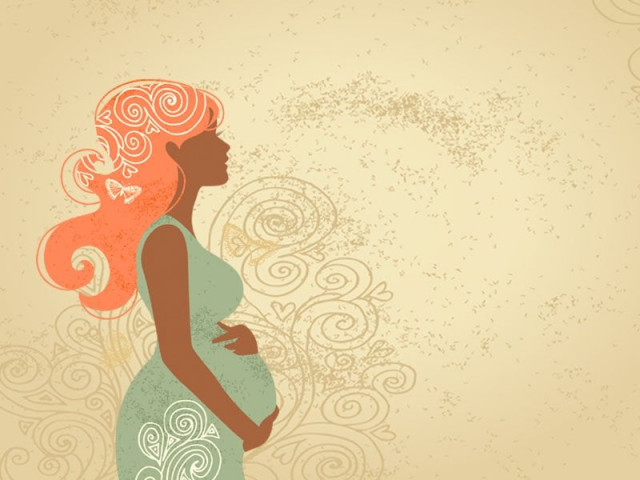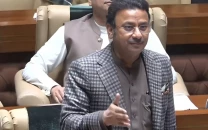Mothers under threat: Arrested development
Surveys show Pakistan’s marginal progress towards achieving MDGs.

Perhaps most serious is Pakistan’s dismal progress in terms of mother and child healthcare. DESIGN: ESSA MALIK
“I dream of a Pakistan where every pregnancy is planned and every child conceived is nurtured, loved, educated and supported.” These famous words were uttered by former prime minister Benazir Bhutto in 1994 at the International Conference on Population and Development (ICPD). Two decades later, this goal remains largely unachieved.
The ICPD Beyond 2014 conference to be held in April this year will review what has been achieved regarding the millennium development goals (MDGs) so far, and make new commitments. Sadly, Pakistan is struggling to meet over 30 indicators under the MDGs, and is on track to attain only nine out of the 41 aimed for 2015, the Planning and Development Minister Ahsan Iqbal, shared with Senate early this month.

But perhaps most serious is Pakistan’s dismal progress in terms of mother and child healthcare. According to the profile for the ICPD prepared by Shirkat Gah in collaboration with the Asian-Pacific Centre for Women (ARROW), Pakistan is lagging behind in several indicators of MDG IV and MDG V.
MDG IV pertains to child mortality reduction and the target was to cut under-five mortality rate by two-thirds, between 1990 and 2015.
MDG V was to improve maternal health by 2015; the target was to reduce the maternal mortality rate by three-quarters between 1990 and 2015.
Shirkat Gah’s report says the number of deaths of children under one year of age per 1000 live births is 69 against the target of 40. The child mortality rate has only marginally decreased, from 117 per thousand live births in 1990-91 to 94 per thousand in 2006-07.
Pakistan’s infant mortality rate is the highest in South Asian region. According to UN’s MDG Data, between 2007-2011 Pakistan’s infant mortality rate was 74. The annual reduction in infant mortality rate in last two decades has been 2.5 per cent which is slow.
According to trends in maternal mortality between 1990 - 2010 survey by World Health Organisation (WHO), Pakistan has a maternal mortality rate (MMR) of 490 in 1990 which decreased to 440 in 1995. The rate decreased significantly over the decade.
“At 276, Pakistan has the highest maternal mortality rate in South Asia, with the same being true for infant mortality rate which at 78 is the highest,” says Dr Tabinda Sarosh of Shirkat Gah.
Maternal health is closely connected to gender issues and literacy. According to the report, female literacy is 35.4 per cent while the average age of marriage for women aged 25-49 is 19.7 years (in urban areas) and 18.8 years (in rural areas).

Dr Sarosh says the survey points towards gaps in social determinants of health that impede a woman’s access to quality reproductive health services, particularly those related to family planning.
Maternal, Neonatal and Child Health (MNCH) Provincial Programme Coordinator Dr Zafar Ikram says progress on the MDG has been uneven, and focusing on mid-level services in rural areas is especially important.
“We need to work on educating males about the reproductive health situation in Pakistan. For this we need a comprehensive counseling programme at grass root level.” This important observation by Population Welfare Department Punjab’s Secretary Altaf Ezid Khan holds a key solution.
Lack of awareness put women in a position where they cannot make informed decisions about their own lives. Research and Development Solutions researcher Dr Muhammad Adnan shared that research conducted in Jehlum and Pak Pattan shows that 77 per cent adolescent girls have no education on puberty, family planning and reproductive health, except what they hear from their mothers or close female relatives. As for married women, the main source of information are their husbands and very few women consult lady health workers for information on reproductive health issues.
Solution Talk
Feeling the pulse of Pakistan’s social realities, Pop Council Programme Director Ali Mir believes that the family planning alone is not enough. Mir feels realistic targets for population control should be set and a multi-sector approach should be adopted.
“We need an implementation plan which also includes monitoring and accountability of service providers. Population commission needs to be made on national as well as provincial levels,” he says.
Dr Sara Saleem, Assistant Professor, Community Health Services Department, Aga Khan University, says a major issue is that a large proportion of Pakistani women continue to deliver in high-risk situations, with unskilled providers of delivery care and outside health care facilities.
Published in The Express Tribune, February 1st, 2014.



















COMMENTS
Comments are moderated and generally will be posted if they are on-topic and not abusive.
For more information, please see our Comments FAQ